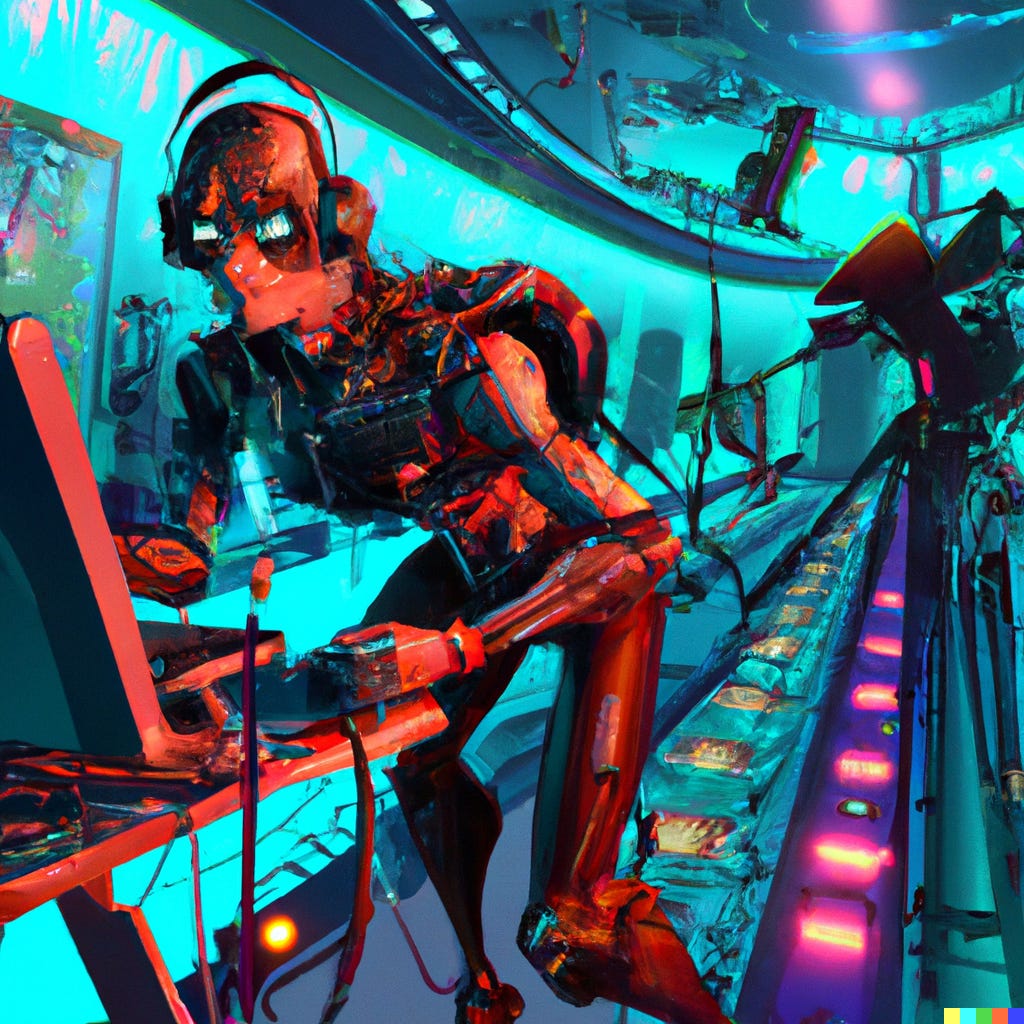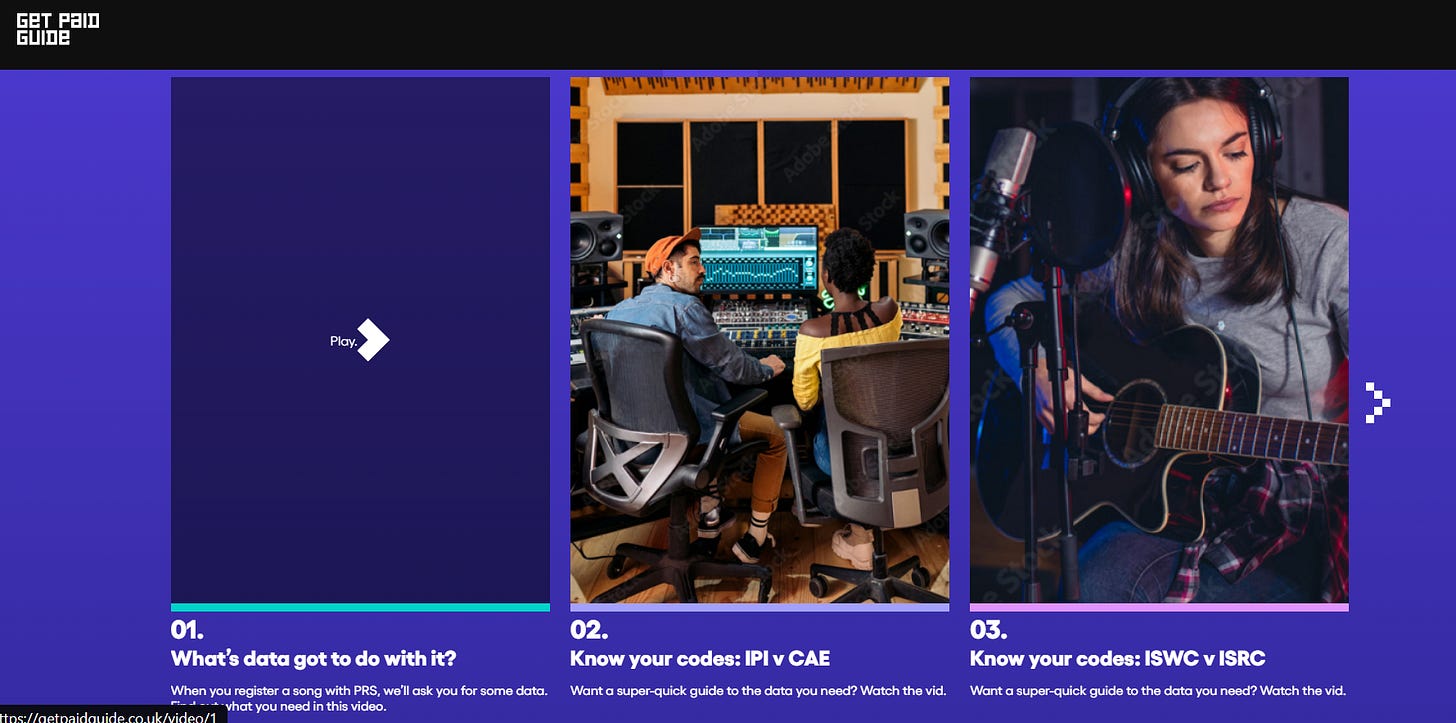✘ Getting off the treadmill - an attempt to socialize the financialization of music
And: Ethical questions around making music with AI; A thoughtful approach to the crossover between gaming and music; The Get Paid Guide; Emerging music markets now diverging; Making DAOs work
We’re at a strange inflection point for the Creator Economy. There’s still a lot happening for many creators around TikTok, Snapchat, Instagram, YouTube, etc. Similarly, musicians are still required to do it all. And not just musicians, podcasters should focus on video as well to diversify. What’s so strange about this need to do it all, is that for anyone who’s ever become successful in the Creator Economy it started with one specific thing - interviewing strangers on the street with a specific question, deep interviews, short sketches, fashion tips, etc. From there, successful creators were able to branch out into music, coffee, and more. Similarly, for anyone who’s ever had, or worked at, a start-up you know that the best route to success is maniacal focus on a single issue, target audience, or tool. So why do we ask musicians to do it all, to be present everywhere? What’s more, this has created a culture where everything you receive needs to be something earned.
Getting off the treadmill starts with a question
The moment you take a step back, we all know that the world won’t collapse around you. Yet, it’s hard to actually do that, to actually take that step back. There’s more though, as Isabel Hazan recently put it: why is asking so hard? She also turns it around, writing about gift giving and receiving:
“When people give to you, it’s a sign they want to be a part of your universe. They want to share some of their life with you. Every resource represents a small part of someone’s life—whether it is their affection, time, money—when they share it with you, they are inviting you into their world, and asking to be invited into yours.”
This matters, because it allows us to think of a way to step off the treadmill of endless content creation. Similar to how Amanda Palmer spoke about the Art of Asking ten years ago, most of us still need to learn this - learn how to ask and learn how to receive.
We’re all on the treadmill, because we feel we need to earn everyone’s time and attention, followed by hopefully earning that reward in terms of a monetary exchange. We see this materializing in our marketing funnels, which I still believe most artists should flip on its head. The first step there is to ask - for time, input, money. And yes, this will feel like asking whether people that follow you value you. But the key is to turn that around and to open up to potential gifts, to the things that those people want to give. This could take the more traditional form of patronage, but it could also be a small investment to bootstrap an idea or project. Conversely, it doesn’t have to be monetary. Maybe somebody can help with design, production, writing, etc.
Valuing the contribution of others
The hardest thing when somebody offers you something is an instant urge to repay them. But if we go back to Isabel Hazan, an offer to help - whether monetary or otherwise - is an invitation to step into someone else’s world. It’s also a moment to let the other person step into your world. So how do you value this? Especially if the gift, to call it that, helps towards the creation of some thing. Perhaps you do want to offer a percentage of any potential revenues. On the blockchain, this can be done by organizing splits in the smart contract. In the more traditional music industry, this can be done by offering a writing or production credit (like EarthPercent, for example).
What makes this even more challenging, as Pavel Shibayev eloquently explained, is that we take for granted our present situations. Moreover, we tend to look forward into time, working towards goals and milestones. But as Pavel explains, it’s just as important to stop and think about what and who got us to where we are. This makes valuing contributions to a creative project even harder, because it means that we need to think about who helped us achieve a goal and who helped us get to the point where we could start thinking about that goal. I don’t write this to try and make valuing contributions even more difficult, just to say that there’s many layers and levels involved. The only way to even be able to assess them is to have some time to reflect. That time is not afforded by the treadmill of content creation.
Value starts with recognition
There’s many different ways to make money work for you. We live in an online economy where every interaction, every moment of attention can be monetized. That’s why we hide away from the general online world in our own spaces. From there, it becomes easier, if that’s the right word, to find different ways of valuing contributions. It becomes more of a two-way street. It becomes less complicated to ask for input or help and more effortless to offer a gift. Or, as the artist Sound of Fractures puts it: the most important thing is to make connections. That’s where it starts. Within the human connections, the art of asking becomes lighter. The art of accepting a gift more painless. The art of stepping into each other’s worlds becomes prosperous.
Of course, we need to support the art, but the economics are social. At that point, the value of the art rolls through the contributions that helped create it. This does not follow hype, or charts, but only the relevance each node finds in connection to the other. The value of any creation, then, emerges from the vitality of the network that shaped it.
LINKS
🧐 Making Music With AI? Start With These Ethical Guidelines (Sarah LaReau)
“Consider how the concept of ethics on the internet has evolved over time. A couple decades ago, the idea would conjure standard decency and lawfulness in basic websites, emails and chat rooms. But now? The internet is social media, television, doorbell cameras, telehealth, banking, shopping, working, the newspaper, video games, everything. The ethics of today's internet is vast and complex. Our daily life consists of algorithms, content and activities that affect everything from our moods and behaviour to politics and public safety. Best practices, policies and norms probably should've been worked out earlier. But based on the regulatory response to the rise of social media, our government doesn't seem set up for the pace of technology. The role of AI in our daily life is going to evolve in a similar way, only the stakes are even higher. We don't have to be complicit this time around.”
✘ This is a must-read for anyone - and that’s probably everyone reading this newsletter - who will engage with generative AI around music. Sarah offers a full-blown framework that you can follow before your next interaction with AI.
🕹️ The Crossover Potential Between Music & Gaming Is Clear – But It Requires a Thoughtful Approach (Vickie Naumann)
“Given the stark contrasts between the two industries, that’s easier said than done. The gaming business thrives on low friction, low barriers to entry, free access, high engagement and incremental micro revenue streams, derived from broad global distribution to gamers around the globe. The music industry delights in friction; enjoys high barriers to entry with unintelligible rights, rules and norms; abhors the word “free”; and prefers just a handful of enormous revenue streams from partners who can be readily controlled.”
✘ A great companion piece to the article from last week where Kat Bassett interviewed Danny Kelleher. Vickie goes into various modes we need to tap into to make any interaction between gaming and music successful. Besides the above quote, there’s also a paragraph on how a license fee is just a starting point.
🫘 New data guide aims to help songwriters get every penny they are due (Chris Cooke)
“It’s generally agreed that, for the metadata agreement to succeed, lots of education needs to happen across the industry so that everyone understands the different data sets and codes that are required to get people credited and paid. The Get Paid Guide seeks to begin that process by providing some useful information and resources for songwriters.”
✘ I mentioned the agreement in the UK last week about metadata alignment. This Get Paid Guide (excellent name) is a tool to help musicians and producers understand what they need to do to make that policy by the Intellectual Property Office actually work out in practice.
↔️ Emerging music markets are now diverging (Srishti Das)
“An emerging market is a region that is transitioning into a developed economy. These markets possess rich cultural diversity, characterised by unique musical traditions, genres, and styles. This cultural richness contributes to developing vibrant local music scenes and emerging new genres or subgenres. However, technological advancements are only beginning to penetrate these markets, bringing an influx of smartphones, internet access, and streaming platforms that significantly impact music consumption patterns. As these markets experience economic growth and expanding middle-class populations, consumers find new ways to engage and interact with music. Consequently, emerging markets often develop in ways distinct from traditional markets due to cultural nuances (e.g., classism in Egyptian music consumption), disposable incomes (e.g., India's diverse behaviours across urban and rural centres), and historical relationships with consumption (e.g., the continued growth of ad-supported consumption in Southeast Asia).”
✘ Srishti is one of my favourite thinkers in music and tech, especially from her time at MIDiA. That she’s now launched her own newsletter is exciting and I would highly recommend you to sign up. Expect more of the flip-thinking already happening in this first instalment.
⚙️ Making DAOs work (Laura Lotti, Nick Houde, Tara Merk)
“In short, just as the creator economy has turned every piece of media into “content,” DAOs have turned any type of work into “contributions,” often without a critical understanding of what this flattening out implies. Because of this, mapping the experience of contributing to DAOs is becoming increasingly crucial for understanding how and in which way DAOs could or should impact the future of work for the better.”
✘ For anyone interested in DAOs, this is a treasure trove and a must-read. The authors put the finger on the issues and work towards solutions - by looking to the past, by using analogies, and going into the people side of things.
MUSIC
Music with a story is better, and Hold Me has a wonderful story. This track is full of vocal samples and rises and falls and rises again to express that feeling of holding on to something even if you know it’s got the potential to hurt you. Listen to the track here, or collect it here.





